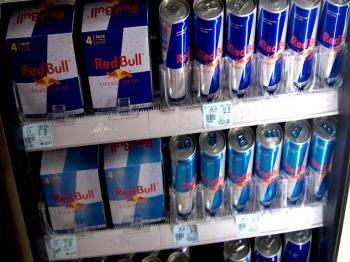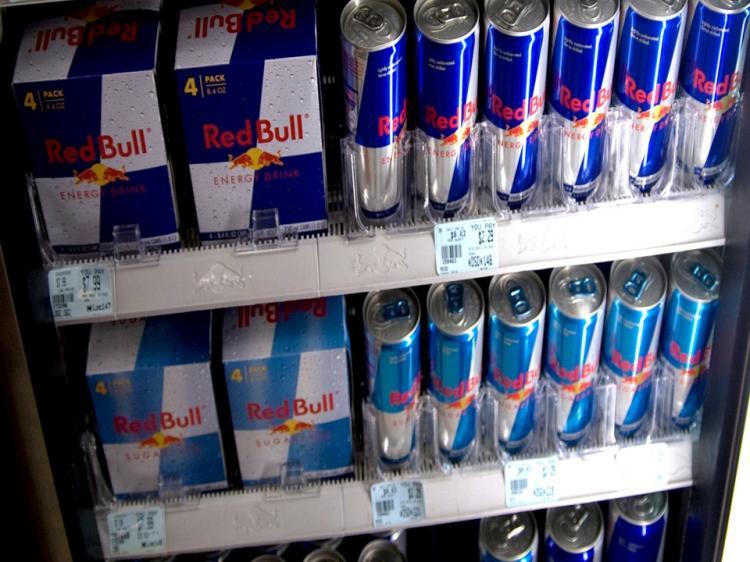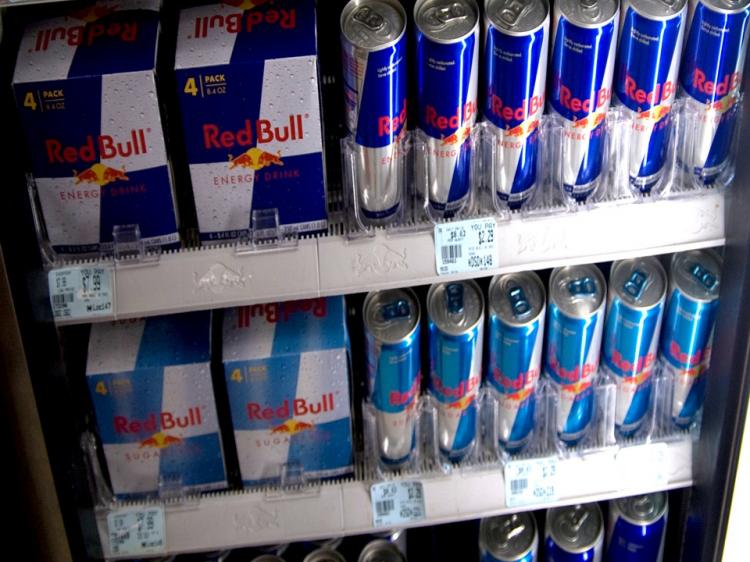A father who believes his 15-year-old son died as a result of consuming a popular energy drink wants Ottawa to ban the sale of the caffeinated, sugar-laced beverages to minors.
James Shepherd told the House of Commons health committee recently that his healthy son died of arrhythmia, an irregular heartbeat, after consuming an energy drink just hours prior to his sudden death in 2008.
Shepherd and the deputy chief health officer of the province of Prince Edward Island (P.E.I.) also urged the committee to place restrictions on the advertising and marketing of such products. The drinks, which include the brand names Red Bull, Full Throttle, and Rockstar, are classified as natural health products in Canada.
Dr. Lamont Sweet told the committee that after the P.E.I. government lifted a ban on the sale of canned soft drinks in May 2008, energy drinks soon appeared across the province.
“Almost immediately, teachers in schools noted students becoming hyperactive, agitated, and unable to concentrate,” he said.
Dr. Sweet said the drinks’ classification as natural health products seems inappropriate given that their concentration of caffeine is “enormous” compared to cola drinks, leading to possible toxic amounts not expected in a natural food.
Energy drinks are banned in P.E.I. schools, but kids can still buy them in stores—something home and school associations across Canada are hoping to change. They are urging Ottawa to implement a nationwide ban on selling the drinks to anyone under 18.
“We just see that it’s a problem and it’s going to become even more of a problem in the future, says Owen Parkhouse, president of the P.E.I. Home and School Federation.
Parkhouse says that in some cases, children have been diagnosed with attention deficit hyperactivity disorder when in fact they were “not getting enough sleep for a combination of reasons, and one of these reasons is consumption of energy drinks with caffeine, and that’s a real issue.”
Dr. Billy Scantlebury, president of the Medical Society of P.E.I., has said that the drinks are targeted at youth and students through clever marketing campaigns. A family physician from Charlottetown has also said the drinks can cause behavioral problems and anxiety in youth, as well as serious conditions such as heart arrhythmias and palpitations.
As far as Red Bull is concerned, Dr. Andreas Kadi, chief science officer for the company, told the health committee that health authorities around the world have concluded that the drink is safe.
He said the level of caffeine in Red Bull equals that contained in a cup of instant coffee, adding that the 250-ml (sold as 8.4 oz in the United States) can label recommends consumption of no more than two cans per day, amounting to 160 milligrams of caffeine in total. He also noted that the label recommends against children drinking Red Bull.
In the United States, while regulations exist limiting the amount of caffeine in soft drinks, the FDA has placed no such restrictions on the upper limit of caffeine allowed in energy drinks, according to a recent in-depth assessment of energy drinks in the U.S. by the Institute of Food Technologists.
Justin Sherwood, president of Refreshments Canada, which represents the country’s nonalcoholic beverage sector, said energy drinks are “subject to tight controls” in Canada and have undergone extensive reviews and analyzes by regulatory authorities worldwide.
“Without exception, these reviews have all confirmed the safety of these products,” he said.
In a presentation to the P.E.I. Standing Committee on Social Development in March 2009, Dr. Scantlebury said that aside from what the drinks contain, there is also a concern with how they are being consumed.
“Adverse reactions occur when the energy drinks are consumed more than one at a time, and ‘chugged’ versus sipped as we would a coffee,” he said.
“There is also the dangerous trend with youth and younger adults to mix energy drinks with alcohol. The effect of high doses of caffeine in combination with alcohol enhances alcohol’s dehydrating effects. In short, the cocktail mix allows one to remain alert longer and therefore capable of consuming more alcohol.”
Energy drinks are banned in France, Sweden, and Denmark, while Ireland is reviewing its policy on the beverages. In 2005, a teenager in Ireland died during a basketball game after sharing four cans of a popular brand of energy drink with friends. In the U.S. there are no bans on the drinks, but the state of Louisiana recently unanimously rejected a bill proposing one.
A subsequent inquest found that the 18-year-old died as a result of sudden adult death syndrome, but nonetheless called for an inquiry into high-caffeine energy drinks.
As well as high amounts of sugar and a host of additives, some energy drinks contain as much as 500 milligrams of caffeine per can, while the amount recommended by Health Canada for adults is no more 400 milligrams per day.
“When you think of the difference in body size between an adult and a child, and that many milligrams of caffeine in the system—of course they’ll be bouncing off the walls, coupled with the sugar and whatnot,” says Parkhouse.
He adds that while the amount of caffeine in energy drinks varies, “for the most part they’re well above what Canadian doctors would say is safe for most children.”
If Ottawa fails to ban the drinks to minors, he adds, P.E.I. should take the lead and become the first province in Canada to implement such legislation.
“I think more and more we’re looking at Prince Edward Island leading the way in a lot of the issues that confront our country, and it’s the easiest place in the country to perhaps do this. So instead of lagging behind I think there’s a move afoot for Prince Edward Island to lead the charge.”
James Shepherd told the House of Commons health committee recently that his healthy son died of arrhythmia, an irregular heartbeat, after consuming an energy drink just hours prior to his sudden death in 2008.
Shepherd and the deputy chief health officer of the province of Prince Edward Island (P.E.I.) also urged the committee to place restrictions on the advertising and marketing of such products. The drinks, which include the brand names Red Bull, Full Throttle, and Rockstar, are classified as natural health products in Canada.
Dr. Lamont Sweet told the committee that after the P.E.I. government lifted a ban on the sale of canned soft drinks in May 2008, energy drinks soon appeared across the province.
“Almost immediately, teachers in schools noted students becoming hyperactive, agitated, and unable to concentrate,” he said.
Dr. Sweet said the drinks’ classification as natural health products seems inappropriate given that their concentration of caffeine is “enormous” compared to cola drinks, leading to possible toxic amounts not expected in a natural food.
Energy drinks are banned in P.E.I. schools, but kids can still buy them in stores—something home and school associations across Canada are hoping to change. They are urging Ottawa to implement a nationwide ban on selling the drinks to anyone under 18.
“We just see that it’s a problem and it’s going to become even more of a problem in the future, says Owen Parkhouse, president of the P.E.I. Home and School Federation.
Parkhouse says that in some cases, children have been diagnosed with attention deficit hyperactivity disorder when in fact they were “not getting enough sleep for a combination of reasons, and one of these reasons is consumption of energy drinks with caffeine, and that’s a real issue.”
Dr. Billy Scantlebury, president of the Medical Society of P.E.I., has said that the drinks are targeted at youth and students through clever marketing campaigns. A family physician from Charlottetown has also said the drinks can cause behavioral problems and anxiety in youth, as well as serious conditions such as heart arrhythmias and palpitations.
As far as Red Bull is concerned, Dr. Andreas Kadi, chief science officer for the company, told the health committee that health authorities around the world have concluded that the drink is safe.
He said the level of caffeine in Red Bull equals that contained in a cup of instant coffee, adding that the 250-ml (sold as 8.4 oz in the United States) can label recommends consumption of no more than two cans per day, amounting to 160 milligrams of caffeine in total. He also noted that the label recommends against children drinking Red Bull.
In the United States, while regulations exist limiting the amount of caffeine in soft drinks, the FDA has placed no such restrictions on the upper limit of caffeine allowed in energy drinks, according to a recent in-depth assessment of energy drinks in the U.S. by the Institute of Food Technologists.
Justin Sherwood, president of Refreshments Canada, which represents the country’s nonalcoholic beverage sector, said energy drinks are “subject to tight controls” in Canada and have undergone extensive reviews and analyzes by regulatory authorities worldwide.
“Without exception, these reviews have all confirmed the safety of these products,” he said.
In a presentation to the P.E.I. Standing Committee on Social Development in March 2009, Dr. Scantlebury said that aside from what the drinks contain, there is also a concern with how they are being consumed.
“Adverse reactions occur when the energy drinks are consumed more than one at a time, and ‘chugged’ versus sipped as we would a coffee,” he said.
“There is also the dangerous trend with youth and younger adults to mix energy drinks with alcohol. The effect of high doses of caffeine in combination with alcohol enhances alcohol’s dehydrating effects. In short, the cocktail mix allows one to remain alert longer and therefore capable of consuming more alcohol.”
Energy drinks are banned in France, Sweden, and Denmark, while Ireland is reviewing its policy on the beverages. In 2005, a teenager in Ireland died during a basketball game after sharing four cans of a popular brand of energy drink with friends. In the U.S. there are no bans on the drinks, but the state of Louisiana recently unanimously rejected a bill proposing one.
A subsequent inquest found that the 18-year-old died as a result of sudden adult death syndrome, but nonetheless called for an inquiry into high-caffeine energy drinks.
As well as high amounts of sugar and a host of additives, some energy drinks contain as much as 500 milligrams of caffeine per can, while the amount recommended by Health Canada for adults is no more 400 milligrams per day.
“When you think of the difference in body size between an adult and a child, and that many milligrams of caffeine in the system—of course they’ll be bouncing off the walls, coupled with the sugar and whatnot,” says Parkhouse.
He adds that while the amount of caffeine in energy drinks varies, “for the most part they’re well above what Canadian doctors would say is safe for most children.”
If Ottawa fails to ban the drinks to minors, he adds, P.E.I. should take the lead and become the first province in Canada to implement such legislation.
“I think more and more we’re looking at Prince Edward Island leading the way in a lot of the issues that confront our country, and it’s the easiest place in the country to perhaps do this. So instead of lagging behind I think there’s a move afoot for Prince Edward Island to lead the charge.”







